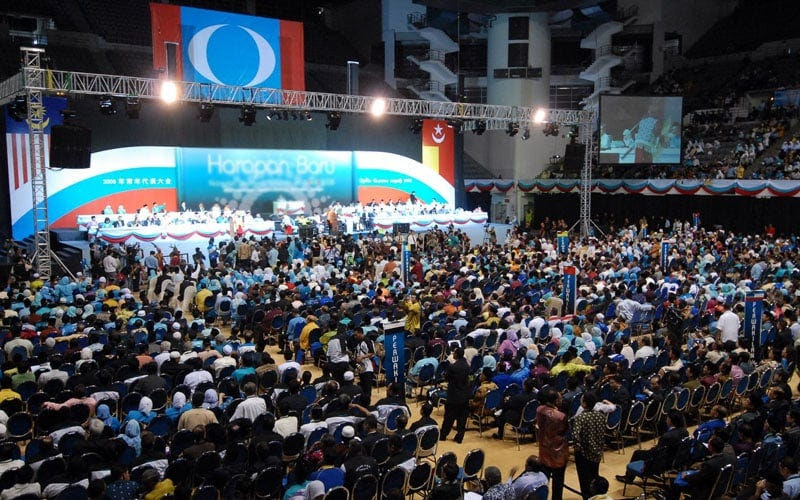Is PKR in crisis?

Continuing erosion of support at the ballot box
Murray Hunter
With the beating UMNO got at the recent state elections, winning only 19 seats across 6 states, the plight of PKR has gone largely unnoticed.
PKR lost 17 seats across the 6 states, leaving with it with only 25 seats. That’s only 5 seats better than UMNO’s poor performance. PKR’s vote has been steadily dropping. PKR’s percentage of the aggregate vote over the last 3 general elections was 20.39% in 2013, 16.94% in 2018, and 15.74% in 2022.
Without any changes, shrinking support for PKR will mean the Pakatan Harapan coalition will mathematically not be able to gain enough seats in the next general election to form a government.
There are members within the party who are aware of this. However, the party leadership hasn’t shown too much concern on this issue. This is a serious issue that PKR must face up to, if it is going to remain relevant in future elections.
PKR must re-imagine itself
PKR needs to look inwardly upon itself and evaluate its own strengths, weaknesses, threats, and future opportunities.
PKR is currently stuck between the old ‘reformasi’ dogma, still held by the older generation within the party, and the Malay community, which has turned its back on PKR at the ballot box. In addition, PKR hasn’t been able to inspire the youth to embrace the party, as it had expected.
Consequently, PKR must soul search if it doesn’t want to see electoral support continue to shrink at the next general election.
PKR is coming to the same position as UMNO. The are now many inactive members of PKR, so of which voted for other parties, or didn’t vote at all during the recent state elections.
The split in PKR back in February 2020 when Azmin Ali and his group left, destroyed the culture of diversity within the party, which some members miss. Diversity was once PKR’s strength.
The dropping of Charles Santiago last general election, Dr Ramasamy Palanisamy, along with a number of other Indian assembly members during the recent state elections has alienated much of the Indian cohort within the party, which represents over 25,000 members. Lack of Indian representation in Penang and Selangor state Excos has just aggravated discontent.
Grassroot concerns
Although PKR has many members who are satisfied with Anwar Ibrahim finally as prime minister, a large number are dismayed at the realities of PKR in government. The crack down on free speech, raid and confiscation of rainbow Swatches, and confiscation of books, are more akin to a Malay-centric government, than one Pakatan is the senior member. The PKR MP for Petaling Jaya just went public and said the ministry has no right to seize any publication it deems inappropriate unless a ban has been gazetted. Many PKR members are dissatisfied about the way some PKR ministers are behaving in their portfolios.
A professional segment within the party is concerned with the resemblance of government policies with recommendations of the IMF and World Bank. The party manifesto appears to have been abandoned by PKR in government.
 |
Membership feeling the party is losing its way
Gripes that members talk about include, PKR’s non-adherence to the democratic process, decisions largely made by one person, often appearing at whim and fancy, without consulting division leaders, nepotism, candidates selected by the top leadership rather than the division, and the failure of PKR in government to undertake reforms. From these perspectives, there is a lot of pessimism.
Some members feel they were punished for their association with Azmin Ali’s group. The dropping of Ginnie Lim as a candidate in the 2021 Melaka state election left a sore point. Likewise, the selection of Najwan Halmi as a candidate in Penang and appointment to the state executive council angered others, over an alleged racial slur issue.
The ‘hurrah’ of the ‘reformasi’ creed which attracted many to the party is gone. Their expectations have been found wanting. There have been resignations from the party, and this weakens PKR on the ground during election time. Some members the writer has spoken to since the state election said ‘what’s the point in fighting hard for PKR, when what Malaysia gets is a government similar to PN anyway’.
Many feel the spirit of defiance PKR was built upon has now descended into a culture of compliance, where the party is hostile towards members who have a different opinion to the official party narrative. Some party members, who were activists in opposition came to enjoy the trimmings of power, becoming perceived as arrogant. Some MPs like Fauziah Salleh, who lost her seat of Kuantan due to this perception, was appointed as a deputy minister, using the senate as a parachute drop.
The future PKR
Its time for the party to become bigger than Anwar Ibrahim. There is a long history of parties fading away after their founder disappears from the public stage. PKR shouldn’t join this group.
Succession planning must begin today, a future leader must be found, and groomed and made ready. Rafizi Ramli was to be that man, but the search must now continue with his performance found to be wanting over the last nine months.
The Anwaristas within the party must look at how they can perpetuate the Anwar legacy into the future. They must look at how the Anwar legacy can be continued after their hero steps down one day.
Seats-wise, PKR didn’t fare much better than UMNO. PKR must read the voters’ message and ensure the party doesn’t become irrelevant to voters in the future. The good news is the decline in PKR support has been gradual, thus there is some time to change course.
However, before PKR can win the hearts and minds of voters, it must win the hearts and minds of its membership.

